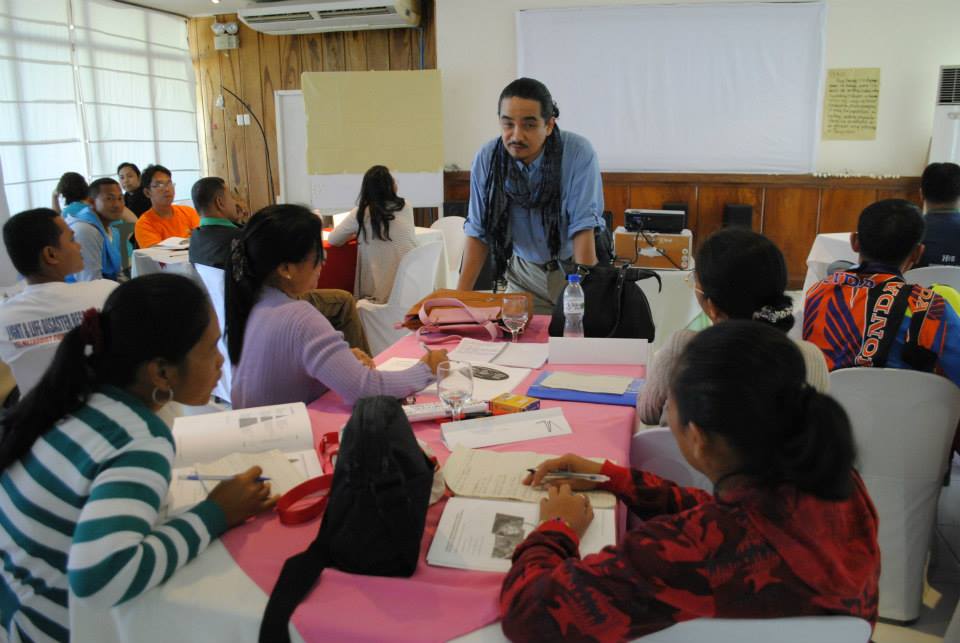
Dann Pantoja shares the Anabaptist Theology as framework for a church-based disaster response ministry.
Pastors and Christian leaders in the Haiyan-affected areas are getting hands-on training in church-based disaster response operations. This program, which is done in partnership with Mennonite Church Canada, Mennonite Central Committee, the Philippine Evangelical Disaster Response Network, and the Peace and Reconciliation Commission of the Philippine Council of Evangelical Churches is a part of a series of training given to 50 pre-qualified pastors and Christian leaders in various cities and municipalities in Samar and Leyte provinces.
The major activities in May include the following:
- May 6 – 9, 2014. Twelve (12) pastors coming from Dulag, Leyte and from Lawaan-Guiuan Areas, Samar finished the Peace and Reconciliation – Disaster Response Network (PAR-DRN) Leadership Training.
- May 13 – 16, 2014. Twenty-two (22) pastors coming from Ormoc-Kananga Areas in Leyte Province, and from Lawaan Municipality in Samar Province finished the PAR-DRN Leadership Training.
These training events have three components:

Kriz Cruzado (center) facilitates the Trauma Healing role-playing session.
Component 1: PsychoSpiritual Counselling and Trauma Healing Processes
:: The Circle Process Approach. This provides a culturally-sensitive process in debriefing pastors. Professional and trained debriefers are facilitating this process and a series of questions will be asked to help the participants express their emotions, fears and hopes. The Circle Process provides a safe space for everyone to express their vulnerability, but also process their aspirations as individuals, family and church leaders. Having been debriefed, these pastors are expected to become psychologically-fit to provide stress debriefing to their church members and their respective neighborhoods in the barangay.
:: Critical Incident Stress Debriefing (CISD) Training. This is a training for the pastors on how to conduct stress debriefing among their immediate community and barangay neighborhoods.
Component 2: Disaster Risk Reduction and Post-Disaster Response Training
:: Disaster Risk Reduction Management Training/Trauma Awareness and Resilience (S.T.A.R) Training. This training enables participants to identify risks or threats prior to the onset of a calamity; thus helping them prepare and reduce disaster risks. Furthermore, this helps them become aware of the presence of trauma following a disaster and helps in their recovery, development of capacity, and coping mechanisms.
:: Post-Disaster Response Training. Participants are taught how to seek and network for support from the Social Welfare and Development and other relevant government offices and access other services for additional support, i.e. livelihood program. Also, using the Do No Harm Policy, participants are taught how to provide relief services, reducing the risk of conflict.

Christian leaders in Ormoc City and surrounding towns finish the three-month course in church-based disaster response.
Component 3: Peace and Reconciliation (PAR) Training
This training will be conducted three months following the DRR and Post-Disaster Response Training to further equip Christian churches with skills necessary in dealing with intra- and inter-organizational conflicts. This will also be the best time to monitor and evaluate the replication of the first two training conducted in various churches. The PAR Training is composed of three books:
:: Biblical Foundations of Peace and Reconciliation
:: PeaceBuilding Skills Development
:: Community Development Principles and Practices
The participants are carefully screened to ensure their ability and commitment to teach their constituents and to replicate the skills they learned in this program. The 50 pastors and Christian leaders in Eastern Visayas have made a prior commitment to use their local resources in training their own church members. It is expected that each of these 50 pastors and Christian leaders would be able to mentor at least 4 volunteers – that’s 200 in total – to actively participate in DRR, post-disaster response and trauma debriefing.
We, at PBCI, will do our best in our training and consulting work so that the Christian leaders in the field will have the capacity to respond rapidly, efficiently, and effectively during times of calamities that frequently strike these provinces.





















